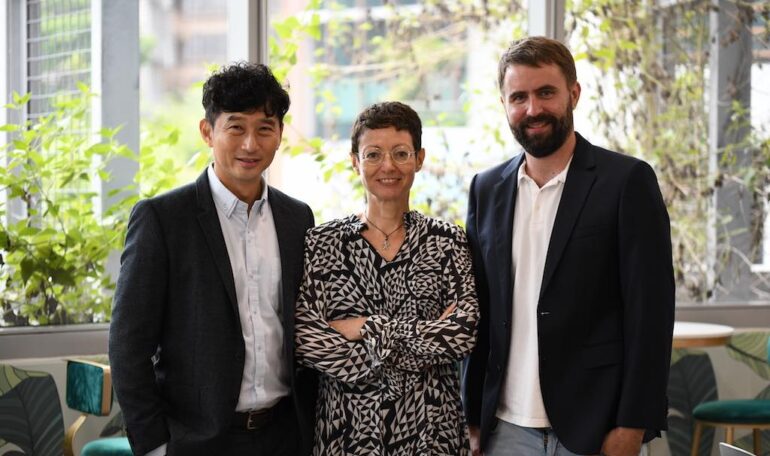TL;DR:
- ImmunoScape, a biotech company, uses machine learning to predict virus specificity in human T-cells.
- The research, published in Cell Reports, analyzed 500+ T-cell responses to various virus antigens.
- Unique T-cell phenotypes were identified, and machine learning accurately predicted antigen specificity.
- This discovery has vast implications for T-cell-based immunotherapies and cancer treatment.
Main AI News:
In a groundbreaking leap forward for the world of immunotherapy, ImmunoScape, a biotechnology company dedicated to advancing next-generation immunotherapies, has unveiled a groundbreaking research study that leverages the power of machine learning to predict the virus specificity of human T-cells. This remarkable achievement, led by ImmunoScape Scientist Michael Fehlings, Ph.D., and published in the esteemed scientific journal Cell Reports, holds the potential to reshape the landscape of T-cell-based immunotherapies and accelerate the discovery of novel therapeutic solutions.
The Study: A Glimpse into the Future of Immunotherapy
ImmunoScape’s trailblazing study delves deep into the immune system’s intricate workings by analyzing over 500 distinct antigen-specific T-cell responses. The research harnesses cutting-edge technologies, such as high-dimensional mass cytometry and single-cell RNA sequencing, to identify unique phenotypic profiles of T cells that target antigens from various virus categories. Notably, the study examined CD8+ T cells’ responses to antigens derived from CMV, EBV, Influenza, and SARS-CoV-2 (COVID-19) in samples from both healthy donors and cancer patients. ImmunoScape’s research team went a step further by developing machine learning models trained on immune profile features, ultimately enabling the precise prediction of viral T-cell specificity.
The Findings: A Breakthrough in Immunology
The study’s findings are nothing short of groundbreaking. Researchers successfully identified distinct phenotypes associated with T cells specific to different virus antigens, a crucial step toward understanding the immune system’s complexities. Machine learning was employed to infer phenotypic signatures from virus-specific T cells, and these predictions were rigorously validated for their functional accuracy. This breakthrough paves the way for an unprecedented phenotypic atlas of CD8+ T cells, shedding light on their antigen specificity.
The Impact: Unlocking the Potential of T-Cell Therapies
ImmunoScape’s peer-reviewed research has far-reaching implications for the field of immunotherapy. By harnessing machine learning, researchers can now predict antigen specificity based on T-cell phenotypes with exceptional precision. This knowledge serves as a powerful tool for developing innovative T-cell-based therapies against a wide array of diseases and indications. ImmunoScape’s proprietary discovery engine, rooted in high-quality, functionally-validated data from millions of T cells, offers a holistic view of T-cell profiles. This approach, linking TCR sequences, phenotypes, and antigen information, promises to expedite the discovery of effective TCR-based therapies for various tumor indications.
Dr. Michael Fehlings, lead scientist at ImmunoScape, emphasized the critical role of high-quality data in their machine learning models: “Our models are trained on high-quality and functionally-validated data produced by our wet-lab – and the better the data that goes into machine learning, the better the predictions are.” This study reaffirms ImmunoScape’s commitment to discovering novel and specific T cells, thereby bolstering their TCR discovery pipeline, especially in the field of oncology.
Looking ahead, ImmunoScape is poised to further revolutionize T-cell-based therapies by utilizing machine learning to identify tumor-specific TCRs. By expanding its machine learning platform’s capabilities, ImmunoScape aims to support the development of groundbreaking TCR-based therapeutics against solid tumors.
Choon-Peng Ng, co-founder and CEO of ImmunoScape, expressed their mission succinctly: “Our mission is to harness the power of machine learning to accelerate the discovery of cancer-specific T cells while expanding access to more effective therapeutics.”
Conclusion:
ImmunoScape’s pioneering use of machine learning to predict T-cell antigen specificity represents a significant advancement in the biotech and immunotherapy markets. This breakthrough could lead to more precise and effective treatments for various diseases, particularly cancer, and underscores the growing influence of AI-driven solutions in the healthcare sector.

